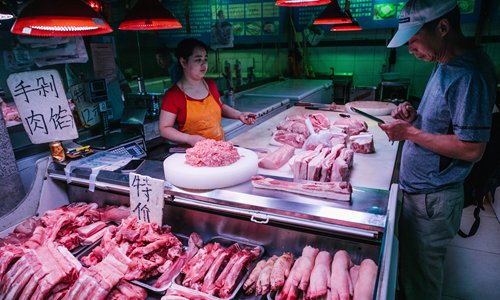HOME >> BUSINESS
China introduces measures to ease rising pork prices
Source:Global Times Published: 2019/9/4 13:43:40

Photo: Li Hao/GT
China announced measures to encourage pork production, as domestic pork prices continue to run high according to latest figures.The measures, jointly released Tuesday by the Ministry of Finance and Ministry of Agriculture in a statement, include implementing subsidies for farmers whose pigs were killed due to African swine fever (ASF), expanding loans to pig farms and increasing incentives for large pig producers.
National data released on Wednesday show that price of hog in the Chinese domestic market rose to 27 yuan ($3.76) per kilogram in late August, up 10.7 percent from mid-August's 24.4 yuan.
The 27-yuan price also recorded a 42-percent increase month-on-month, according to China's National Bureau of Statistics (NBS).
Industry observers said the high price may persist for some time given the gap between supply and demand due to ASF.
China has been rolling out measures to ease the tight supply of pork and to stimulate production.
The Ministry of Transport on Monday also waived highway toll fees for trucks carrying pigs or frozen pork to support the industry. The exemption begins this month and will remain until next June.
The Ministry of Commerce on August 29 noted that it is considering the proper time to release frozen pork into the market.
Local governments have also started to make efforts to guarantee pork supply. For instance, East China's Jiangxi Province noted that it will strive to supply more than 10 million hogs annually to other provinces, and Southwest China's Sichuan Province stated it would ensure the production of 40.08 million hogs within a year, domestic news site 21jingji.com reported on Tuesday.
In addition, "The herd of sows has started to increase, especially in northeastern and northwestern provinces of China, including Liaoning, Jilin and Shannxi," Wang Zuli, a research fellow with the Chinese Academy of Agricultural Sciences, told the Global Times in a recent interview.